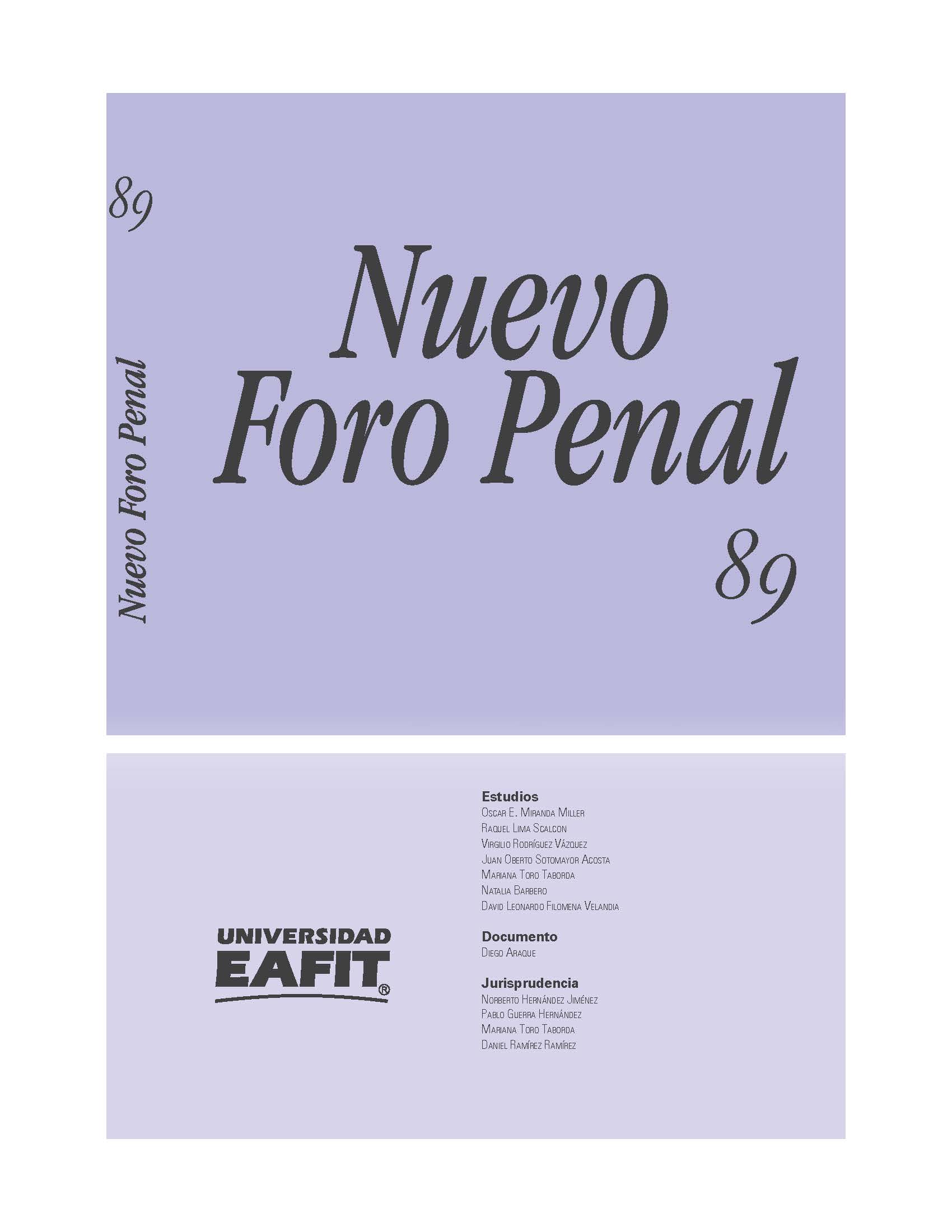Comportamientos Diferenciados por Rol y Responsabilidad Moral de la Abogacía
Main Article Content
Keywords
Rol, abogacía, comportamiento, sistema penal, visión tradicional, clientes, moral, partidismo neutral, relación abogadocliente
Resumen
El presente escrito tiene como objeto analizar la manera como las relaciones entre abogado-cliente pueden llegar a convertir a los primeros, esto es, a los abogados, en personas “amorales” e incluso “inmorales en nuestro trato con el resto de la humanidad”. En otros términos, se quiere reflexionar sobre si existen justificaciones adecuadas para que los profesionales de la abogacía habitemos en eso que, según Wasserstrom, en el mejor de los casos es un mundo “moralmente simplificado”, frecuentemente “amoral” y a veces “claramente inmoral”. En consideración con ello, resulta pertinente afrontar interrogantes tales como: ¿Debe atribuirse responsabilidad moral a quienes asistan a sus representados para lograr resultados claramente contrarios al interés público aunque pueda argumentarse que dichas gestiones no exceden el marco de la ley? ¿Varía la contestación a esta pregunta, ya sea según la naturaleza de la representación o asesoramiento en cuestión, o las características de la parte representada o asesorada?
Descargas
Referencias
CHARLES P. CURTIS, “The Ethics of Advocacy”, en Stan. L. Rev., Vol. 4, 1951, p. 3.
DEBORAH RHODE, “Ethical Perspectives on Legal Practice”, en Standford Law Review, Vol. 37, 1985, pp. 589, 605.
ELLMANN, STEPHEN, “Lawyers and Clients” en U.C.L.A L, Vol. 34, 1987, p. 717.
FREEDMAN, MONROE H, “Judge Frankel's search for truth” en U. Pa. L. Rev., , vol. 123, 1974, p. 1060.
FREEDMAN, MONROE H, “Professional Responsibility of the Criminal Defense Lawyer: The Three Hardest Questions”, en Mich. L. Rev., Vol. 64, 1966, p. 1469
HARRY I. SUBIN, “The Criminal Lawyer’s ‘Different Mission’: Reflections on the ‘Right’ to Present a False Case”, en Geo. J. Legal Ethics, Vol. 1, 1987, p. 125.
HARRY I. SUBIN, “The Criminal Lawyer’s ‘Different Mission’: Reflections on the ‘Right’ to Present a False Case”, en Geo. J. Legal Ethics, Vol. 1, 1987, p. 125.
KIMBERLY KESSLER FERZAN, “Torture Necessity and the Union of Law and Philosophy”, en Rutgers L. J., Vol. 36, 2004, p. 184.
L. RHODE, DEBORAH & LUBAN, DAVID, Legal Ethics 38, Ed. 4th, Foundation Press, 2004.
LUBAN, DAVID, “Lysistratian Prerrogative: A Response to Stephen Pepper”, en Law & Social Inquiry, Vol. 11, Nº 4, American Bar Foundation, 1986.
MARVIN E. FRANKEL, The Search for Truth: An Umpire´s View, Vol. 123 Nº 5, University of Pennsylvania, Law Review, 1975.
MONROE H. FREEDMAN, “Personal Responsibility in a Professional System”, en Cath. U. L. Rev., Vol. 27, 197, pp. 191–192.
MONROE H. FREEDMAN, “Personal Responsibility in a Professional System”, en Cath. U. L. Rev, Vol. 27., 1978, pp. 191-192,
MOUNTS, SUZANNE, “Premeditation and Deliberation in California: Returning to a Distinction Without a Difference”, en U.S.F. L. Rev., Vol. 36, pp. 261 – 296.
NILSEN, EVA, “The Criminal Defense Lawyer’s Reliance on Bias and Prejudice” en Geo. J. Legal Ethics, Vol. 8, 1994, pp. 1-3.
RHODE , DEBORAH, In the Interest of Justice 3, Oxford University Press, New York, 2000.
RHODE, “Access to Justice: An Agenda for Legal Education and Research”, en Fordham L. Rev. Vol. 69, 2001, pp.104-106.
RICHARD WASSERSTROM, “Lawyers as Professionals: Some Moral Issues” en Human Rights, Vol. 5, 1975, pp. 1-24.
ROGER C. CRAMTON, “Furthering Justice by Improving the Adversary System and Making Lawyers More Accountable” en Fordham L. Rev., Vol. 70, 2002, p. 1599.
ROGER C. CRAMTON, On Giving Meaning to “Professionalism”, en ABA Teaching and Learning Professionalism: Symposium Proceedings, Ed. Oct 2-4, 1996, pp. 7-8.
SIMON, WILLIAM H, “The Ideology of Advocacy: Procedural Justice and Professional Ethics” en Wis. L. Rev., 1978, pp. 29-30. Disponible en: https://www.scribd.com/document/349281667/THE-IDEOLOGY-OF-ADVOCACY-PROCEDURAL-JUSTICE-AND-PROFESSIONAL-ETHICS
SMITH, ABBE y MONTROSS, WILLIAM, “The Calling of Criminal Defense” en Mercer L. Rev., Vol. 50, 1999, pp. 443-446.
STEPHEN BRIGHT, “Keep the Dream Alive” en Yale L. Report, Vol. 2, Fall, 1999.
STEPHEN PEPPER, “The Lawyer’s Amoral Ethical Role: A Defense, a Problem, and some Possibilities” en Law & Social Inquiry, Vol. 11, Nº 4, 1986, pp. 613 – 634.
STRAUSS, MARCY, “Toward a Revised Model of Attorney-Client Relationship: The Argument for Autonomy” en NCL Rev., vol. 65, 1987, p. 315
TED SCHNEYER, “Moral Philosophy’s Standard Misconception of Legal Ethics” en Wisc. L. Rev, 1984, p. 1529
WILLIAM H. SIMON, “Ethical Discretion in Lawyering 101” en Harv. Law Review, Vol.1083 Nº 1083, 1988.
WILLIAM H. SIMON, The Practice of Justice 1, cit., p. 170. Citando a LUBAN, DAVID, “Lawyers and Justice: An Ethical Study”, en Princeton University Press, 1988, pp. 58-66.
WILLIAM SIMON, “The Ethics of Criminal Defense”, en Mich. L. Rev., Vol. 91, 1992, p. 1703.
ZITRIN, RICHARD & LANGFORD, CAROL, “The Moral Compass of the American Lawyer: truth, justice, power, and Greed” en Responsive Community, Vol. 9, 1999, pp. 65-68

